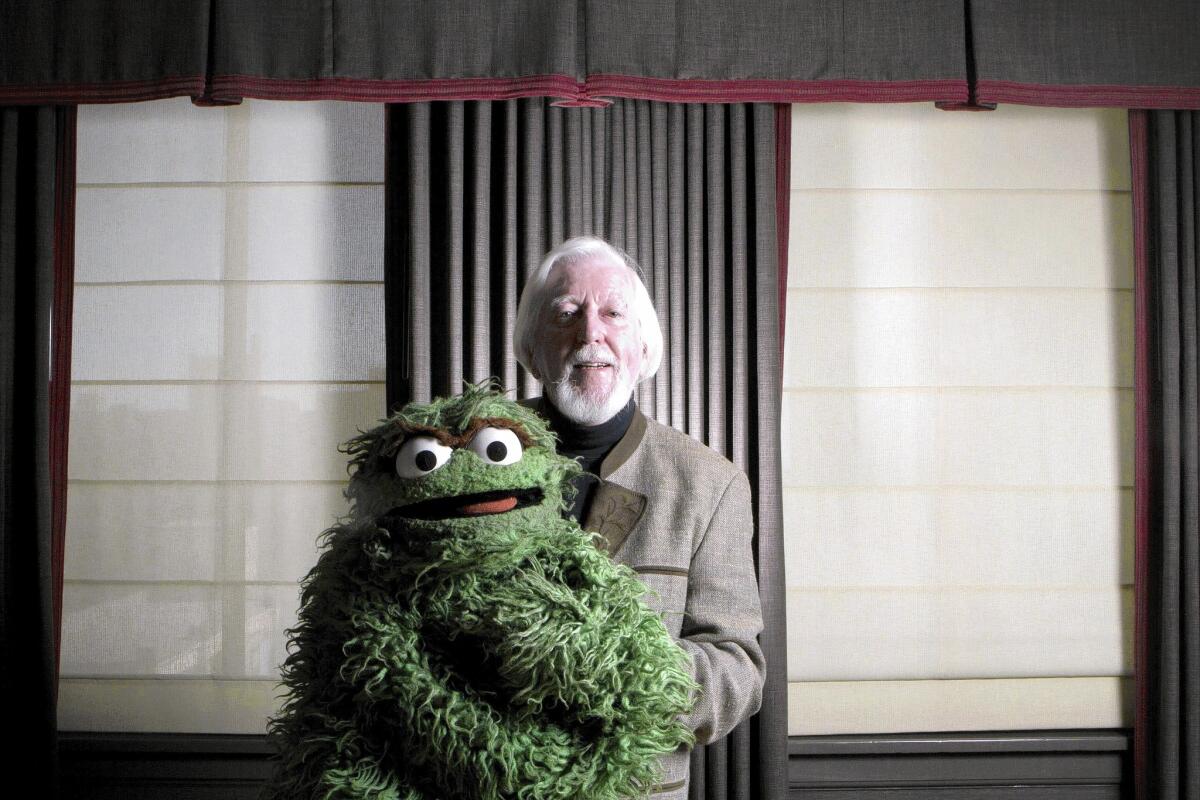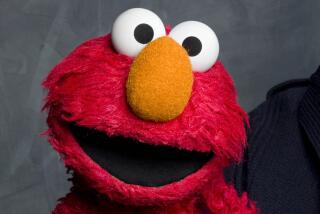Caroll Spinney’s proudly worn Big Bird’s yellow feathers for 45 years

- Share via
Imagine your dream grandpa: He’s the best storyteller. Dotes on your grandma. Has plenty of sage wisdom to share. Calls you “cutie.”
Oh, and he’s also Big Bird.
That’s basically Caroll Spinney, the 80-year-old puppeteer who has played the 8-foot-tall feathery friend as well as Oscar the Grouch on “Sesame Street” for the last 45 years. Yep: The man who gives voice to some of toddlers’ most beloved characters is an octogenarian — a fact that has remained somewhat of a secret until Spinney agreed to participate in a documentary about his life.
Spinney wrote a memoir about a decade ago, though he says it’s really available only on EBay nowadays. “I Am Big Bird: The Caroll Spinney Story,” which premiered at the Los Angeles Film Festival over the weekend, is aiming to bring his story to a wider audience than the book reached. The movie shows Spinney performing on the set of the PBS program but also uses archival footage to spotlight some of the memorable moments in his career — his relationship with Jim Henson, traveling abroad with Bob Hope and filming the 1983 special “Big Bird in China.”
When directors Dave LaMattina and Chad Walker set out to make the film five years ago, they assumed there was a good chance they’d be capturing Spinney in his final year on “Sesame Street.”
“It quickly became evident,” LaMattina said with a laugh, “that that was just not going to happen.”
“Nah,” said Spinney, sitting beside the filmmaker, “If you rest, you rust.”
The pair were chatting in a downtown Los Angeles hotel last weekend, hours before the outdoor festival premiere screening of the film. Oscar the Grouch — who, Spinney explained, was first made out of a ratty bath mat — was strewn on a nearby chair. (Spinney’s unable to travel with Big Bird, given the character’s size.)
Spinney’s reluctance to retire is at the core of “I Am Big Bird,” as the film explores the personality traits he shares with the characters he portrays. Indeed, even at 80, Spinney is physically fit and keeps the long coif he sported in the 1970s — even though his hair has since turned white. He’s sharp and energetic, though he does have a tendency to ramble; at numerous points during this interview, LaMattina sweetly urged Spinney to return to answering a specific question instead of going off on a tangent about meeting Shirley Temple.
It’s clear that Spinney views Big Bird as an extension of himself. In one of the film’s more poignant scenes, he recalls an instance in which the costume was vandalized by a group of teens. Lying disheveled in a pile of dirt, a big patch of feathers had been ripped off the bird’s chest and an eye was hanging off.
“It was like seeing my little boy wrecked,” Spinney said, his voice heavy with emotion. “I didn’t have a great time at school. I was teased because of my name, my size, my big ears — and shame on them. I was a good kid who just wanted everybody to like me. That’s the way Big Bird is. I’m reliving a better childhood through that bird who is a child, and I think I’m awfully lucky to have that child.”
Still, playing Big Bird is demanding. After he pulls the character’s orange legs on like a pair of pants, the bird’s yellow body is placed over his torso. To control Big Bird’s head, he uses his left arm, which he has to hold in the air constantly. He’s also not able to see through the costume, so he interacts with the other puppets by watching a monitor that is strapped to his chest via what he refers to as an “electronic bra.” Oh, and the lines: Since he’s hidden from view, he doesn’t have to memorize them — instead, he cuts up his script and tapes it to his monitor. It’s a lot to juggle.
But Spinney looks beyond the mechanics of the puppeteering and finds something more fulfilling in the role. “I’ve always said that of all the characters, Big Bird is more human than anyone on the show — even the humans. He has human foibles and emotions,” he said.
“Sesame Street” executives — who declined to comment for this story but signed off on the documentary — hired an apprentice, Matt Vogel, 18 years ago to understudy for Spinney in preparation for his retirement. Though Vogel sometimes fills in for Spinney when there are scenes the veteran would rather not work on (he’s not a fan of green screen work, for instance), the young puppeteer has ended up devoting more of his time toward directing episodes of the show than covering for his mentor.
Even if Spinney becomes physically unable to play Big Bird in the next few years, he doesn’t plan on handing the gig over to Vogel. Instead, he says, he could perform the voice while Vogel does the movements. Plus, he points out, the show films only three months out of the year. Oh, and his father lived until he was 90.
“My mother used a quarter pound of butter just on the toast in the morning, and yet he lived that long,” Spinney said with a chuckle. “I only use Smart Balance — that’s good for you, actually — before I put the eggs in the pan.”
“Oh, you’ve got a long time left, Caroll,” LaMattina chimed in reassuringly. “I’m not worried about that.”
“I Am Big Bird,” meanwhile, is coming out on the heels of “Being Elmo,” the 2011 documentary that focused on puppeteer Kevin Clash, Spinney’s longtime colleague. The film was a critical success, but Clash later became the subject of unsavory headlines when three young men claimed he had engaged in underage sex with them. (Clash was cleared when the lawsuits were dismissed.)
The new “Sesame Street”-centric doc raises some interesting questions about why Elmo eventually usurped Big Bird as the program’s most popular puppet. As the years progressed, the doc posits, the show slowly began aiming at a younger audience. Because Elmo is 3 and Big Bird is 6, the red furry creature increasingly proved more relatable.
“It was a little disappointing,” Spinney admitted. “So I had to get used to that a little bit. But it was not a bad decision on their part — and it was nice to know they didn’t say, ‘Hit the road.’”
In the ‘80s, though, Big Bird was so cherished by the children of America that NASA asked Spinney if he’d orbit the Earth on a space shuttle to help generate interest in space among youngsters. Despite the danger of the mission, Spinney — then in his 50s — agreed. But officials at NASA quickly realized there was no way to bring the sizable costume on board — and so Spinney was replaced by a teacher.
That shuttle was the Challenger.
“I remember watching the explosion on TV,” he said. “Your scalp kind of moves when you see something like that.”
Twitter: @AmyKinLA
More to Read
Only good movies
Get the Indie Focus newsletter, Mark Olsen's weekly guide to the world of cinema.
You may occasionally receive promotional content from the Los Angeles Times.











